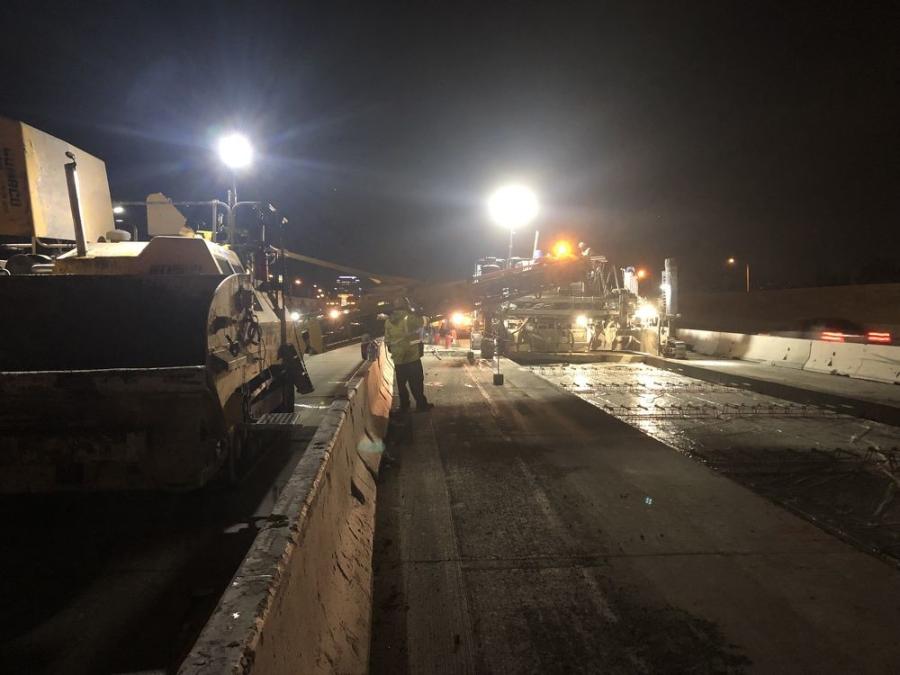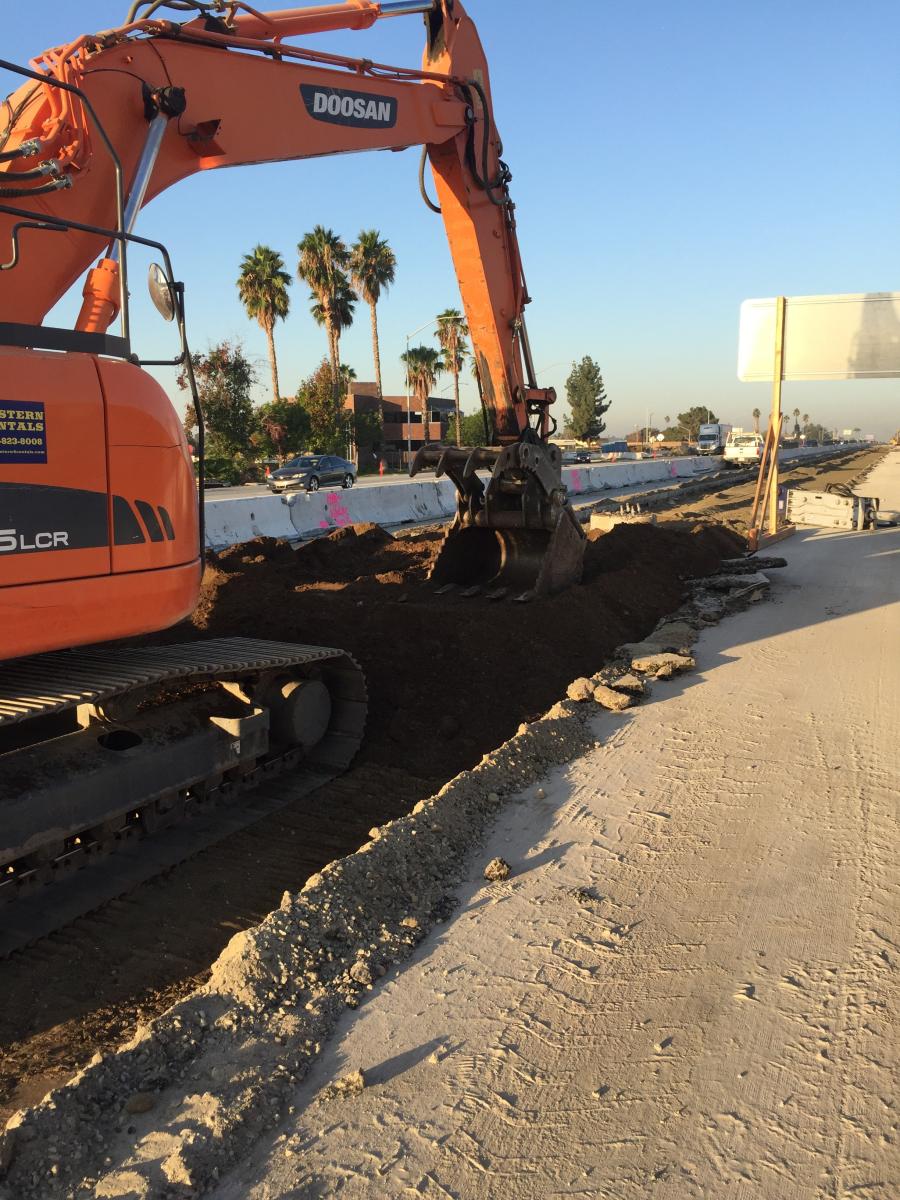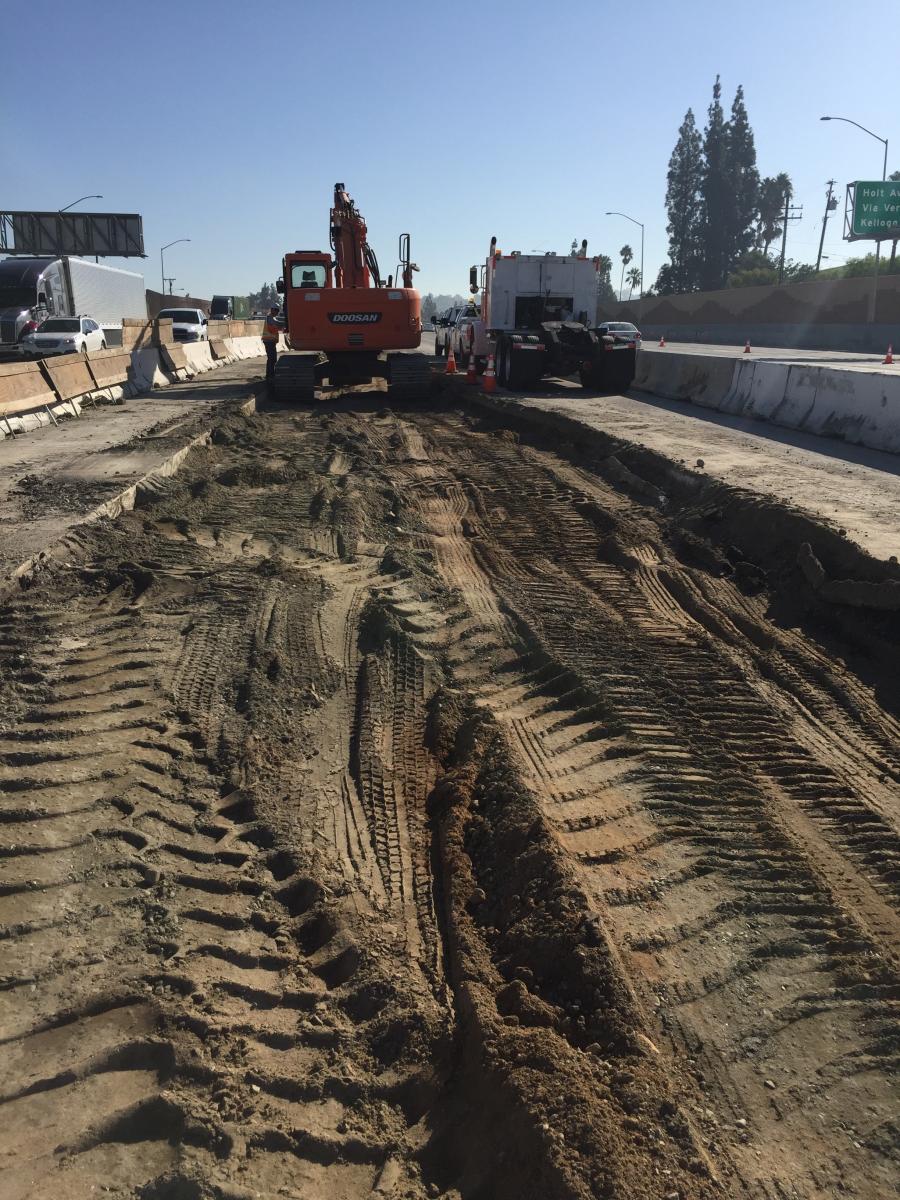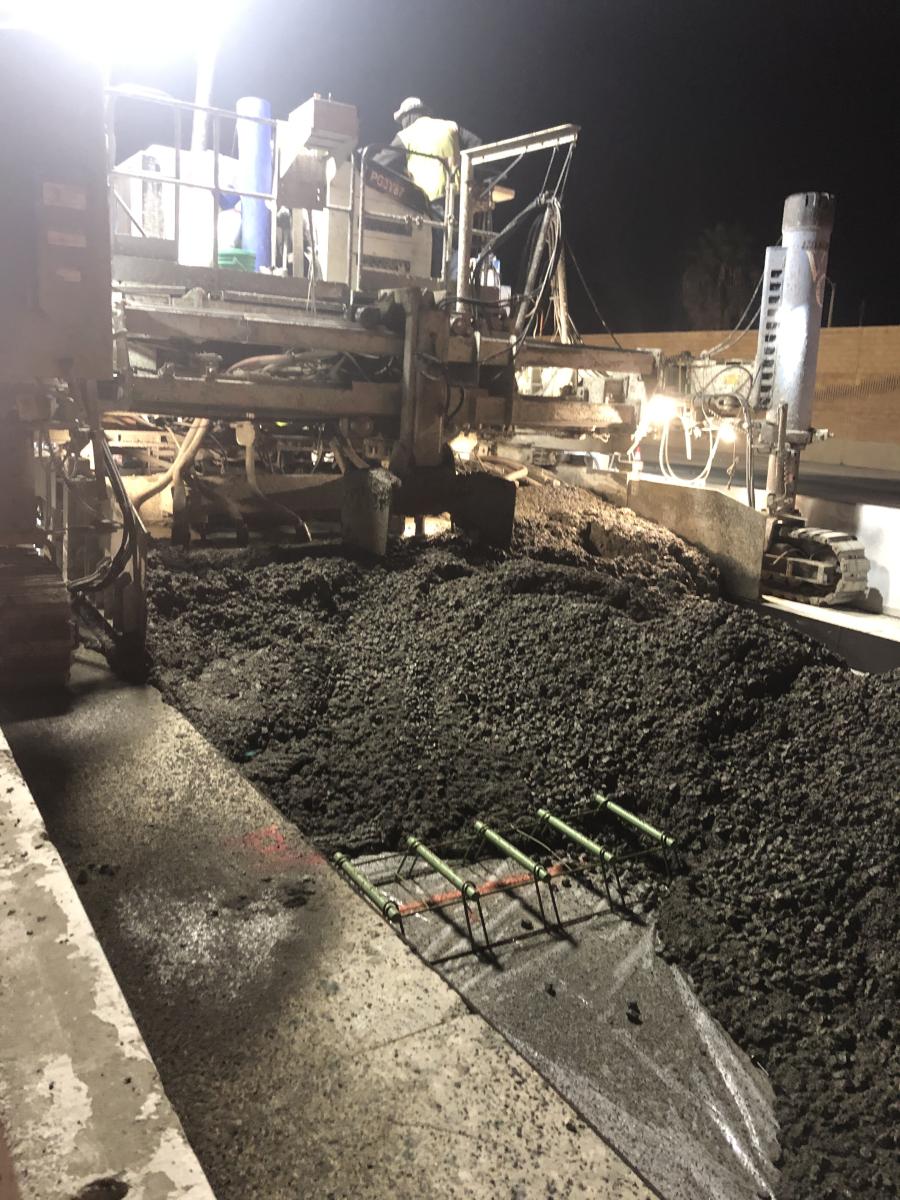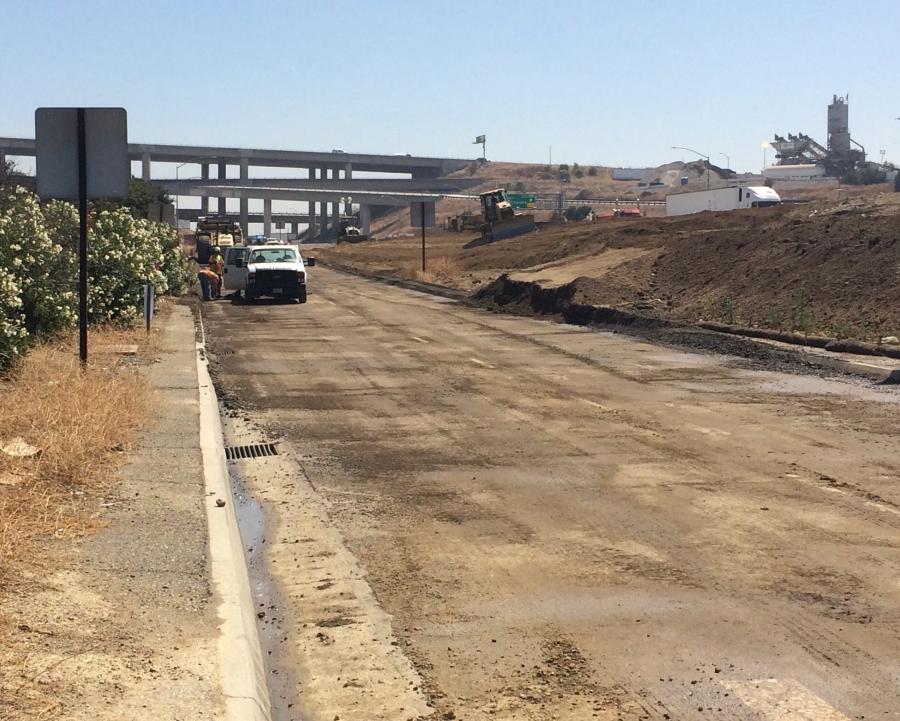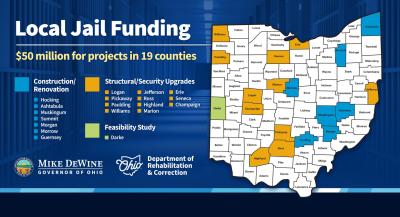The paving operations required coordination with many crews for work that could only be performed at night due to heavy traffic during the day.
The last two segments — 2 and 3 — of the California Department of Transportation's (Caltrans) San Bernardino Freeway (I-10) High Occupancy Lane Project are pressing forward, with segment 2 expected to be completed at the end of April and segment 3 in the summer of 2021.
The three segments total $625 million, funded by state and federal dollars. The $166 million contract for segment 1 was awarded to Flatiron Corp., the $160 million contract for segment 2 was awarded to Ames Construction Inc., and the $183 million contract for segment 3 was awarded to Guy F. Atkinson Construction LLC.
The key element of the initiative is the construction of one High Occupancy Vehicle (HOV or carpool) lane along the San Bernardino Freeway (I-10) in each direction between the San Gabriel River Freeway (I-605) and Orange Freeway (SR-57).
"The project will increase the 557-mile carpool lane system in Los Angeles County, add freeway capacity, reduce congestion by encouraging carpooling, improve traffic flow, and reduce energy consumption, thereby improving air quality, said Jim Medina, a Caltrans Public Information Officer, District 7. "Sound walls will be constructed to mitigate noise at various locations throughout the project boundaries and help improve the quality of life for residents."
The work also includes bridge widening, ramp realignment and retaining wall construction is taking place.
Segment 1 construction, between I-605 and Puente Avenue in Baldwin Park, was completed in Feb. 2016. Segment 2, which covers I-10 between Puente Avenue and Citrus Street, began in summer 2014 and segment 3, between Citrus Street in West Covina and SR-57, began in April 2016.
"Once all segments are completed, there will be a continuous, 40-mile HOV lane from downtown Los Angeles to I-15 in San Bernardino County," said Medina.
The sound walls range from 12-to-16 ft. tall and have a mountain range pattern.
Segment 2
The segment 2 sound walls on the eastbound side of I-10 are being built at the Puente Avenue undercrossing to eastbound Puente Avenue off-ramp; eastbound Puente on-ramp to west of Cameron Avenue undercrossing; west of Lark Ellen Avenue undercrossing to eastbound Azusa Avenue off-ramp; and west of Hollenbeck Avenue to west of Citrus Avenue undercrossing. The westbound ones include: west of Citrus Avenue undercrossing to east of the Hollenbeck undercrossing; west of the Hollenbeck undercrossing to the westbound Azusa off-ramp; westbound Azusa on-ramp to Vincent Avenue off-ramp; Vincent on-ramp to Sunset Avenue off-ramp; west of Sunset undercrossing to North Roberto Avenue; Pacific Avenue on-ramp to west of Camron Avenue undercrossing; and east of Willow Avenue to the Puente off-ramp.
Segment 3
For segment 3, the sound walls are at eastbound I-10: Grand Avenue overcrossing to Holt Avenue off-ramp; and Holt undercrossing to East Garvey Avenue and westbound - westbound I-10: Garvey Avenue on-ramp to Holt overcrossing; Holt Avenue off-ramp to Via Verde Street; and the Via Verde Street overcrossing.
The segment 3 infrastructure was designed by Anthony Hughes, Project Engineer, Caltrans District 7.
"The widening concept has been in the works for many years as part of Caltrans long-term projects to widen the freeway from El Monte to the County Line," said Caltrans Refugio Dominguez. "Assistance has been received from various engineers throughout the 10-year process, but Hughes was responsible for the detailed work for segment 3. One of the challenges is the traffic handling, to be done in stages, and shifting traffic flow in different patterns for the six stages. At one point, the westbound traffic was split by bridge columns. These traffic challenges were mainly solved during the design phase by Hughes and Barkef Karapetian, Caltrans' District 7 Senior Traffic Engineer. Karapetian created the master plan for traffic handling for the widening and the replacement of the existing freeway, which includes lowering the freeway profile for a quarter of a mile. During construction, the Resident Engineer Rodolfo Cao (Caltrans District 7) and Atkinson have assisted in minor changes to the traffic handling plans."
Another challenge has been water seepage during excavations in the vicinity of Forest Lawn — Covina Hills (cemetery) area, and this was solved by installing a perforated pipe system to release the water from the paving sections. The project is designed for a 20-year lifespan.
Major highway construction in the L.A. area is never easy and it impacts traffic.
"There will be construction closures, with most of work taking place during evening hours and appropriate signage and detours are posted," said Medina. "The project requires long-term ramp closures at various on- and off-ramps along I-10, including Azusa, Vincent, West Covina Parkway, Puente, Citrus, Barranca, Grand, Holt and Kellogg Drive. No consecutive ramp closures will take place. Caltrans is posting construction notices ahead of time so that the public is readily informed before these long-term closures take place."
Serious efforts are being undertaken to minimize the noise of night operations.
"Noise levels near project areas will be the same level as ordinary freeway traffic and should not disturb neighborhoods nearby," said Medina "Caltrans is monitoring noise levels during construction to minimize the impacts."
Caltrans is extensively using social media to keep motorists updated on lane closures and detours.
Ames Construction is working on the following elements: painting the Puente Avenue UC Bridge and the Sound wall monument; installation of the irrigation systems; planting and landscaping; and the installation of electrical systems — pull boxes, controller cabinets, and spare batteries. Upcoming work includes the installation of four sign structures in the median.
Up to five crews are working on segment 2 during day and night shifts. The subcontractors include: Vanguard Construction, Select Electric Inc., Griffith Company, Boone Trucking Inc., Austin Enterprise, Sierra Landscape Development Inc., and Century Sweeping.
Crews have removed around 200,000 cu, yds. of dirt and to date have placed about 105,000 cu. yds. of concrete, 22,000 tons of asphalt and concrete, and more than 3 million lbs. of steel.
Atkinson Construction has completed the following elements: Stages 1 to 4, which includes 70 percent of the earth work and the drainage installation, all of the bridges and the walls, and 60 percent of the paving.
The remaining work includes placing 60,000 cu. yds. of export dirt, 30,000 cu. yds. of LCB, 50,000 cu. yds. of JPCP, and 4,000 tons of AC; 90-day ramp closures (Kellogg/Holt); and phased ramp switches (Via Verde).
"Extensive work planning to keep our crews safe and productive includes additional signage and minimizing the number of operations in a given area," said Mike Ashby, Atkinson's project manager.
Staying on Schedule
The lane construction is pressing forward on schedule.
"There have been some challenges," said Ashby. "We encountered ground water and utility relocation issues."
There are 10 full crews on site on peak days, including those from major subcontractors such as the Griffith Company and Sierra Landscape Development Inc.
To date crews have removed 46,000 cu. yds. of concrete. 23,000 cu. yds. of, asphalt, 250 tons of steel, and 285,000 CY of dirt.
"We do recycle materials on site," said Ashby. "The material most repurposed is asphalt, which is pulverized down and reused for structure backfill and class 3 sections. We also reuse the concrete removals, which are crushed and used for LCB concrete."
The totals for new materials are still being tabulated.
Ames is using standard construction equipment, which is purchased and rented from local and regional dealerships. Atkinson crews are using cranes, excavators, dozers, loaders and pavers that are manufactured by Caterpillar (supplied by Quinn-Cat), Xtreme, and GOMACO. The firm purchases and rents equipment from regional and local dealerships. CEG
Irwin Rapoport
A journalist who started his career at a weekly community newspaper, Irwin Rapoport has written about construction and architecture for more than 15 years, as well as a variety of other subjects, such as recycling, environmental issues, business supply chains, property development, pulp and paper, agriculture, solar power and energy, and education. Getting the story right and illustrating the hard work and professionalism that goes into completing road, bridge, and building projects is important to him. A key element of his construction articles is to provide readers with an opportunity to see how general contractors and departments of transportation complete their projects and address challenges so that lessons learned can be shared with a wider audience.
Rapoport has a BA in History and a Minor in Political Science from Concordia University. His hobbies include hiking, birding, cycling, reading, going to concerts and plays, hanging out with friends and family, and architecture. He is keen to one day write an MA thesis on military and economic planning by the Great Powers prior to the start of the First World War.
Read more from Irwin Rapoport here.
Today's top stories



